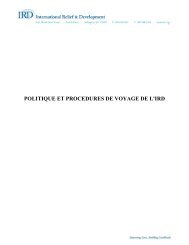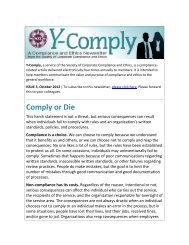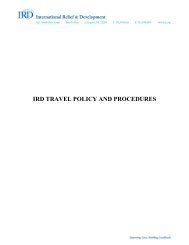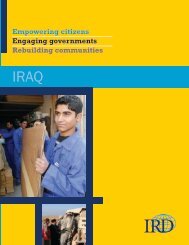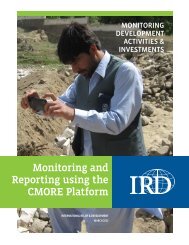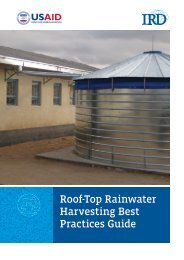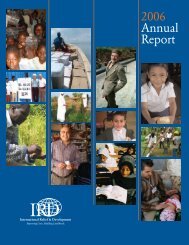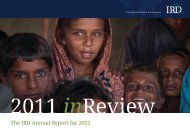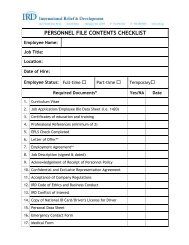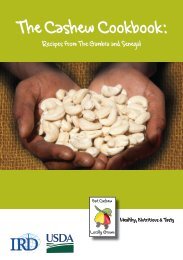What I find is that anywhere I have traveled, whether it's the United ...
What I find is that anywhere I have traveled, whether it's the United ...
What I find is that anywhere I have traveled, whether it's the United ...
You also want an ePaper? Increase the reach of your titles
YUMPU automatically turns print PDFs into web optimized ePapers that Google loves.
2007<br />
ANNUAL REPORT<br />
CELEbRATiNg TEN YEARs<br />
Dear Friends,<br />
Th<strong>is</strong> year marks iRD’s 10-year anniversary. Ten years ago, my wife, Jasna, and i set<br />
out on a journey into <strong>the</strong> unknown, to challenge <strong>the</strong> typical ways of doing development,<br />
to create a different kind of organization. We imagined an organization<br />
much like iRD <strong>is</strong> today. We had confidence <strong>the</strong> organization would be successful,<br />
but we never imagined <strong>that</strong> in less than 10 years iRD would be <strong>the</strong> largest private<br />
recipient of UsAiD funds.<br />
iRD takes r<strong>is</strong>ks, and i believe <strong>that</strong> we are successful because we tackle <strong>the</strong> challenges<br />
<strong>that</strong> many o<strong>the</strong>rs fail to address, in places where many o<strong>the</strong>rs will not go.<br />
We <strong>have</strong> built our reputation as experts in working in conflict and post-conflict<br />
environments because we put <strong>the</strong> needs of people ahead of convenience. We let<br />
those needs determine program feasibility, and not our religious, political, philosophical,<br />
or ideological outlook. We deliver to donors who <strong>have</strong> trusted us —<br />
<strong>whe<strong>the</strong>r</strong> it <strong>is</strong> with $100 or $100 million — through rapid project startup, sound<br />
implementation, and thorough monitoring and evaluation. We hire strong local<br />
staff members and build on <strong>the</strong>ir networks and skills. And we <strong>have</strong> a core staff<br />
<strong>that</strong> has been stable, loyal, and committed to sharing <strong>the</strong> goals of iRD. Th<strong>is</strong> <strong>is</strong> our<br />
heart.<br />
i am humbled by <strong>the</strong> work we <strong>have</strong> done and <strong>the</strong> challenges we <strong>have</strong> met. in iraq, we <strong>have</strong><br />
three ground-breaking programs — our humanitarian work, our community action and<br />
mobilization, and our economic development and stabilization projects in over 18 cities. in<br />
Afghan<strong>is</strong>tan, we are working with communities to build roads, monitor and evaluate major<br />
vertical infrastructure projects, and provide vocational training for construction trades. by<br />
combining technical expert<strong>is</strong>e with a community-based approach, we are changing <strong>the</strong> way<br />
development <strong>is</strong> done.<br />
From building roads in Afghan<strong>is</strong>tan to building peace in indonesia, from reducing stigma<br />
from HiV/AiDs in Ukraine to reducing child malnutrition in Chad, we <strong>have</strong> also changed<br />
lives. in more than 24 countries, we provide people trying to recover from d<strong>is</strong>aster or<br />
conflict, people suffering from joblessness, poverty, and hunger with both <strong>the</strong> resources and<br />
<strong>the</strong> opportunity to rebuild <strong>the</strong>ir lives.<br />
Jasna and i fully believe <strong>that</strong> <strong>the</strong> next 10 years will give iRD <strong>the</strong> opportunity to develop new<br />
partnerships, expand our work, and touch new lives.<br />
Dr. Arthur b. Keys, Jr.<br />
Speaking at <strong>the</strong> 10th<br />
Anniversary Gala,<br />
March 12, 2008,<br />
Washington DC<br />
Celebrating Ten Years | 2007 ANNUAL REPORT 2
1998<br />
TEN YEARs OF iMPROViNg LiVEs<br />
<strong>What</strong> I <strong>find</strong> <strong>is</strong> <strong>that</strong> <strong>anywhere</strong> I <strong>have</strong> <strong>traveled</strong>, <strong>whe<strong>the</strong>r</strong> it’s<br />
<strong>the</strong> <strong>United</strong> States, Sou<strong>the</strong>ast Asia, or Central Africa, people<br />
want <strong>the</strong> same things. They want stability, <strong>the</strong>y want jobs,<br />
<strong>the</strong>y want health and education for <strong>the</strong>ir families.<br />
—Dr. Arthur b. Keys, Jr.<br />
3<br />
One program,<br />
one country,<br />
15 employees, 300,000<br />
people helped<br />
iRD begins its first<br />
project, providing<br />
pharmaceuticals and<br />
medical supplies to<br />
internally d<strong>is</strong>placed<br />
persons in georgia<br />
1999<br />
Four programs,<br />
five countries,<br />
39 employees, 375,000<br />
people helped<br />
iRD opens offices in<br />
Washington, D.C.,<br />
and adds programs<br />
in indonesia, serbia,<br />
Azerbaijan, and<br />
Macedonia<br />
2001<br />
16 programs,<br />
seven countries,<br />
77 employees,<br />
2 million people helped<br />
iRD begins <strong>the</strong><br />
Community<br />
Revitalization<br />
through Democratic<br />
Action program in<br />
Western serbia, and<br />
later in sou<strong>the</strong>rn<br />
Montenegro, for<br />
UsAiD<br />
iNTERNATiONAL RELiEF & DEVELOPMENT<br />
2003<br />
35 programs,<br />
14 countries,<br />
735 employees,<br />
25 million people helped<br />
iRD opens offices in<br />
Erbil and baghdad,<br />
iraq to help iraq<strong>is</strong><br />
rebuild <strong>the</strong>ir<br />
communities and<br />
provide humanitarian<br />
aid to those d<strong>is</strong>placed<br />
by <strong>the</strong> war<br />
2004<br />
iRD responds within<br />
days to <strong>the</strong> indian<br />
Ocean tsunami <strong>that</strong><br />
devastated <strong>the</strong> Aceh<br />
region of indonesia,<br />
providing emergency<br />
food, water, and<br />
medical supplies to<br />
survivors<br />
2005<br />
47 programs,<br />
17 countries,<br />
1,400 employees,<br />
40 million people helped<br />
iRD begins <strong>the</strong><br />
Human Resources<br />
and Log<strong>is</strong>tics<br />
support program<br />
in Afghan<strong>is</strong>tan to<br />
provide oversight to<br />
<strong>the</strong> reconstruction<br />
effort<br />
2005<br />
iRD responds to<br />
Hurricane Katrina,<br />
providing emergency<br />
water and supplies<br />
2008<br />
2006<br />
iRD expands<br />
its agricultural<br />
development programs<br />
in Africa, opening<br />
offices in Chad, Niger,<br />
sudan, Cameroon, and<br />
swaziland<br />
More than 75 programs<br />
25 countries<br />
More than 2,500 employees<br />
Nearly $750 million in aid<br />
More than 100 million people helped<br />
Celebrating Ten Years | 2007 ANNUAL REPORT 5
OARD OF DiRECTORs AND sENiOR sTAFF<br />
Board of Directors<br />
Rev. Dr. Arthur B. Keys, Jr.<br />
President and CEO<br />
international Relief & Development, inc.<br />
Arlington, VA<br />
Ms. Patricia Tyson<br />
Vice President<br />
Labor/Community Advocate<br />
Washington, DC<br />
Mr. F. Leon Howell<br />
Secretary<br />
international Journal<strong>is</strong>t<br />
silver spring, MD<br />
Mr. Daniel L. Florea<br />
Treasurer<br />
President<br />
Florea Financial group<br />
Ruxton, MD<br />
Mr. Harold Cranston<br />
Owner and President<br />
Cranston investments, LLC<br />
san Franc<strong>is</strong>co, CA<br />
Rev. Dr. John Deckenback<br />
Conference Min<strong>is</strong>ter<br />
<strong>United</strong> Church of Chr<strong>is</strong>t<br />
Central Atlantic Conference<br />
baltimore, MD<br />
Mr. John Wesley Gilbert<br />
Major gifts Officer<br />
Trust for Public Land<br />
Atlanta, gA<br />
Mr. Roland Johnson<br />
Foundation Director<br />
Philadelphia, PA<br />
Ms. Vera R. Silverman<br />
President and CEO<br />
Rosenblum silverman sutton<br />
New York, NY<br />
Senior Staff<br />
Arthur B. Keys, Jr.<br />
President and CEO<br />
Jasna Basarić-Keys<br />
Chief of Program Operations<br />
Ingrid Fitzgerald<br />
Chief Admin<strong>is</strong>trative Officer<br />
Gulraiz Hassan<br />
Chief Financial Officer<br />
Michele Cato<br />
Chief of Program Development<br />
Steve Anlian<br />
senior Program Development Adv<strong>is</strong>or<br />
Karla Bonner<br />
Chief, iraq Programs<br />
Thoric Cederström<br />
senior Program Development Adv<strong>is</strong>or<br />
Lali Chania<br />
Acting Director of Health<br />
Isatou Jack<br />
Director of sustainable Food and<br />
Agriculture systems<br />
Gary Kinney<br />
Director of grants and Contracts<br />
Adam Koons<br />
Director of Relief<br />
James Lanning<br />
Director of Acqu<strong>is</strong>itions and Log<strong>is</strong>tics<br />
John McCormack<br />
Acting Director of Economic Development<br />
Mario Rizos<br />
Director of infrastructure<br />
Richard Santos<br />
Director of Communications and Advocacy<br />
Natalija Stamenković<br />
Director of Democracy, governance, and<br />
Community Development<br />
Elsie Tama<br />
Director of Program Resource Management<br />
iRD <strong>is</strong> a charitable, non-profit, non-governmental organization <strong>that</strong> focuses its operations<br />
in regions of <strong>the</strong> world <strong>that</strong> present social, political, and technical challenges. iRD’s m<strong>is</strong>sion<br />
<strong>is</strong> to reduce <strong>the</strong> suffering of <strong>the</strong> world’s most vulnerable groups and provide <strong>the</strong> tools and<br />
resources needed to increase <strong>the</strong>ir self-sufficiency.<br />
Our strategic goal <strong>is</strong> to accompl<strong>is</strong>h our m<strong>is</strong>sion by implementing<br />
targeted, cost-effective relief and development<br />
programs <strong>that</strong> improve <strong>the</strong> lives of <strong>the</strong>se vulnerable groups.<br />
Facts about iRD:<br />
• iRD was founded by Dr. Arthur b. Keys, Jr. and Jasna<br />
basarić-Keys in 1998.<br />
• iRD provided nearly $278 million development ass<strong>is</strong>tance<br />
in 2007 to Africa, Asia, <strong>the</strong> balkans, Latin America, <strong>the</strong><br />
Middle East, and <strong>the</strong> Newly independent states.<br />
• since 1998, iRD has provided nearly three-quarters of<br />
a billion dollars worth of goods and services in humanitarian<br />
and development ass<strong>is</strong>tance to vulnerable populations<br />
around <strong>the</strong> world.<br />
• Currently, iRD has program offices in 25 countries worldwide.<br />
• iRD implements cost-effective relief and development<br />
programs in six core sectors and special projects as needed.<br />
iRD works in collaboration with a wide range of organizations in <strong>the</strong> design and implementation<br />
of humanitarian relief and development aid programs, including U.s. and foreign<br />
government agencies, bilateral and international donor organizations, international finance<br />
organizations, faith-based organizations, advocacy groups, international and local NgOs,<br />
U.s. corporations, and members of <strong>the</strong> U.s. Congress.<br />
AbOUT iRD<br />
Children in Sri Lanka.<br />
6 iNTERNATiONAL RELiEF & DEVELOPMENT<br />
Celebrating Ten Years | 2007 ANNUAL REPORT 7
iRD PROgRAM L<strong>is</strong>T 2007 sUCCEss sTORY<br />
Afghan<strong>is</strong>tan<br />
• Construction Trades Training<br />
Center<br />
• Human Resources and Log<strong>is</strong>tical<br />
support<br />
• strategic Provincial Roads –<br />
sou<strong>the</strong>rn and Eastern Afghan<strong>is</strong>tan<br />
Armenia<br />
• D<strong>is</strong>tribution of Medical<br />
Commodities<br />
• improved Primary Health Care<br />
Assessment<br />
• school Repair and Restoration<br />
Azerbaijan<br />
• D<strong>is</strong>tribution of Medical<br />
Commodities<br />
Cambodia<br />
• better Foods for better Lives<br />
• Child survival<br />
Cameroon<br />
• Agricultural Commodity<br />
D<strong>is</strong>tribution<br />
Chad<br />
• Emergency Food for Work and<br />
Agricultural Ass<strong>is</strong>tance<br />
• Emergency seed and Tool<br />
D<strong>is</strong>tribution<br />
• Prov<strong>is</strong>ion of Agricultural Materials<br />
• Livelihood security Restoration for<br />
Refugees, iDPs, and Locals<br />
• Rehabilitation of Elementary school<br />
• World Food Programme Food<br />
D<strong>is</strong>tribution<br />
Georgia<br />
• D<strong>is</strong>tribution of Medical<br />
Commodities<br />
• Agricultural Production and Rural<br />
Enterpr<strong>is</strong>e support<br />
Indonesia<br />
• better Foods for better Lives<br />
• Community-based Water and<br />
sanitation<br />
• Decentralized basic Education iii<br />
• Emergency Medical Response<br />
• small Towns and Rural<br />
Communities Water Restoration<br />
Program<br />
• supply of Agricultural Commodities<br />
• Water, sanitation, and Hygiene<br />
Iraq • Community stabilization Program<br />
• Humanitarian Ass<strong>is</strong>tance in iraq<br />
• iraq Community Action Program<br />
Jordan<br />
• Emergency Ass<strong>is</strong>tance for iraqi<br />
Refugees and People of Concern<br />
• strategic Health support Program<br />
Laos<br />
• safe Educational Opportunities<br />
Lebanon<br />
• Lebanon Emergency Relief and<br />
Employment Program<br />
• National Campaign for initiating,<br />
sorting, and Recycling<br />
Montenegro<br />
• Community Revitalization through<br />
Democratic Action<br />
Mozambique<br />
• Capable Partners Health Project<br />
• Community Mobilization and<br />
Training in Hygiene and sanitation<br />
Activities<br />
• Drought Mitigation through<br />
Community Management of<br />
Water Harvesting systems and<br />
Conservation Farming<br />
• Emergency Response to Drought<br />
• Emergency Response to Flooding<br />
• Food for Work<br />
• Livelihoods Rehabilitation Post-<br />
Cyclone Flavio<br />
• The National Council for HiV/<br />
AiDs Positive Organizational<br />
Development Project<br />
• Prov<strong>is</strong>ion of Water, Hygiene, and<br />
sanitation Conditions for Long-<br />
Term Resettlement Centers<br />
• Reducing <strong>the</strong> impact and<br />
Transm<strong>is</strong>sion of HiV/AiDs<br />
• World Food Programme Food<br />
D<strong>is</strong>tribution<br />
• Women First HiV/AiDs<br />
Nepal<br />
• Reintegration and Resettlement for<br />
Conflict Affected Populations<br />
Niger<br />
• Community Nutrition Project<br />
• D<strong>is</strong>tribution of Treatment Rations<br />
to Moderately Malnour<strong>is</strong>hed infants<br />
and/or Pregnant and breastfeeding<br />
Mo<strong>the</strong>rs<br />
• Pastoral<strong>is</strong>t Livelihood improvement<br />
Program<br />
• World Food Programme Food<br />
D<strong>is</strong>tribution<br />
Serbia<br />
• belgrade Youth Center Restoration<br />
Project<br />
• international Food Relief<br />
Partnership Program<br />
• Community Revitalization through<br />
Democratic Action<br />
• serbian Agribusiness Activity<br />
Sri Lanka<br />
• Community based solar<br />
D<strong>is</strong>infection system (sOD<strong>is</strong>) for<br />
Water and Hygiene Awareness<br />
Program<br />
• Rural integrated Water sanitation<br />
and Hygiene Project<br />
• Food D<strong>is</strong>tribution for Returnees<br />
• Hambantota Water Project<br />
• Hambantota Educational support<br />
improvement Program<br />
South Sudan<br />
• D<strong>is</strong>tribution of seeds, Tools, and<br />
F<strong>is</strong>hing Kits<br />
• Radio D<strong>is</strong>tribution and Civic<br />
Education Project in sudan<br />
Swaziland<br />
• Drought Mitigation through<br />
Community Management of<br />
Water Harvesting systems and<br />
Conservation Farming<br />
Ukraine<br />
• D<strong>is</strong>tribution of Medical<br />
Commodities<br />
• Rapid Response to Avian influenza<br />
• Reducing stigma and<br />
D<strong>is</strong>crimination Associated with<br />
HiV/AiDs<br />
<strong>United</strong> States, M<strong>is</strong>s<strong>is</strong>sippi<br />
• gulf Coast Community service<br />
Center<br />
• Needs Assessment and Community<br />
Mapping<br />
• Youthbuild<br />
Worldwide<br />
• Ocean Freight Reimbursement<br />
Program<br />
M<strong>is</strong>s<strong>is</strong>sippi Program Builds Houses for Katrina Survivors<br />
gulfport resident Kennie Keys had a tough time at school. “it was a hard life; i got in trouble<br />
at school. but after i was introduced to <strong>the</strong> iRD program it’s kept me out of trouble,” said<br />
Keyes.<br />
Keys’ high school referred him to Youthbuild, a program in M<strong>is</strong>s<strong>is</strong>sippi managed through<br />
iRD Us’s gulf Coast Community service Center. The program works with local schools to<br />
identify kids who <strong>have</strong> recently dropped out of high school or are at r<strong>is</strong>k of doing so. it <strong>the</strong>n<br />
offers <strong>the</strong>m <strong>the</strong> opportunity to learn basic construction trades while working towards <strong>the</strong>ir<br />
graduate equivalency degree.<br />
“it’s taught me how to use teamwork, be positive, and, well, how to build a house,”<br />
Keys said. “We learned how to build th<strong>is</strong> whole house.”<br />
in August 2005, M<strong>is</strong>s<strong>is</strong>sippi and <strong>the</strong> gulf Coast region as a whole was devastated<br />
by Hurricane Katrina. More than 1,600 people died during <strong>the</strong> storm, an estimated<br />
65,000 people are still living in Federal Emergency Management Agency (FEMA)<br />
trailers, and hundreds of thousands more <strong>have</strong> been permanently d<strong>is</strong>placed.<br />
iRD Us first came to M<strong>is</strong>s<strong>is</strong>sippi only a few days after <strong>the</strong> storm, initially drawing<br />
on its d<strong>is</strong>aster experience from <strong>the</strong> indian Ocean tsunami and elsewhere, as well as its<br />
network of resources. shortly <strong>the</strong>reafter, iRD Us establ<strong>is</strong>hed <strong>the</strong> gulf Coast Community<br />
service Center in gulfport to help manage <strong>the</strong> longer-term needs of <strong>the</strong> survivors.<br />
“After Hurricane Katrina, things were rough,” said survivor Nancy brown. “When we<br />
came back, everything was destroyed. i don’t <strong>have</strong> words. i’ve never been through a<br />
storm like <strong>that</strong>. i just lost everything. it wasn’t until i went to iRD <strong>that</strong> things began<br />
to change.”<br />
The center puts survivors in touch with <strong>the</strong> resources <strong>the</strong> community desperately<br />
needs – everything from contacting state and local governments on <strong>the</strong>ir behalf, to<br />
financial and legal ass<strong>is</strong>tance, to rebuilding homes. The center has helped hundreds of<br />
families move back into a home, in part thanks to <strong>the</strong> Youthbuild program.<br />
“Now i <strong>have</strong> a beautiful home,” said brown, looking at <strong>the</strong> house iRD Us helped her<br />
build. “i thank iRD — and my community — from <strong>the</strong> bottom of my heart. i can’t believe<br />
it.”<br />
The community residents who are a part of Youthbuild can believe it. They see it every day.<br />
“During Katrina, me and my family lived on <strong>the</strong> beach and <strong>the</strong>n moved to a FEMA trailer<br />
for a while before we moved into an apartment,” said Youthbuild participant steven Ricks.<br />
“i know i was happy when i got back into a home myself. i’d love to help someone else do<br />
<strong>that</strong>.”<br />
Kennie Keys works on a<br />
house frame in Gulfport,<br />
M<strong>is</strong>s<strong>is</strong>sippi.<br />
8 iNTERNATiONAL RELiEF & DEVELOPMENT<br />
Celebrating Ten Years | 2007 ANNUAL REPORT 9
ECONOMiC gROWTH<br />
Mechanics training in Iraq.<br />
since 1999, iRD’s economic development programs <strong>have</strong> addressed some of <strong>the</strong> most difficult<br />
<strong>is</strong>sues facing farmers and entrepreneurs in vulnerable communities around <strong>the</strong> world.<br />
Often integrating health, democracy and governance, and o<strong>the</strong>r sectors into its programming,<br />
iRD’s economic growth sector programs <strong>have</strong> helped individuals and whole communities<br />
to respond to recurring d<strong>is</strong>asters and provide for <strong>the</strong>mselves.<br />
The economic growth sector focuses on five core areas:<br />
• Development of sustainable agriculture systems, including support for agribusiness<br />
competitiveness, market linkage, and value chain development in an environmentally<br />
friendly production and processing systems environment;<br />
• Livelihood security;<br />
• Micro-enterpr<strong>is</strong>e development and small/medium enterpr<strong>is</strong>e development;<br />
• Local economic planning and development, supporting economic development, and<br />
public/private sector partnerships; and<br />
• Job creation and access to training, market information, and credit.<br />
by developing programs <strong>that</strong> take into account communities as a whole, not<br />
just <strong>the</strong> agricultural context, iRD has ass<strong>is</strong>ted tens of thousands of farmers and<br />
<strong>the</strong>ir communities better respond to global agricultural conditions. in Western<br />
serbia, for example, programs <strong>have</strong> focused on agricultural sector development<br />
through both <strong>the</strong> introduction of new technology and improvements in quality<br />
production, market linkages, and market access for local businessmen, including<br />
everything from livestock marketing, green market development, and small dairy<br />
processing to streng<strong>the</strong>ning cooperative developments and associations.<br />
iRD provides micro-grants and technical ass<strong>is</strong>tance to vulnerable individuals,<br />
marginal groups, and resource-poor farmers to provide <strong>the</strong>m with both <strong>the</strong><br />
financial resources and skills <strong>the</strong>y need to develop a sustainable livelihood.<br />
in iraq, iRD has helped thousands of internally d<strong>is</strong>placed people and o<strong>the</strong>rs<br />
affected by conflict with grants covering start-up costs for small businesses such<br />
as music stores and auto repair shops. iRD operates similar emergency livelihood<br />
security programs in Lebanon, Montenegro, and serbia.<br />
Micro and small businesses form <strong>the</strong> backbone of many local and rural economies, but <strong>the</strong><br />
business owners often need help learning how to effectively increase <strong>the</strong>ir business’ reach.<br />
iRD ass<strong>is</strong>ts with business and market linkage services, access to improved production technologies,<br />
organizational ass<strong>is</strong>tance to improve <strong>the</strong>ir efficiency and bargaining power, and integration<br />
into ex<strong>is</strong>ting value chains to ensure growth and sustainability. For example, projects<br />
in Montenegro <strong>have</strong> sped up and streamlined <strong>the</strong> business reg<strong>is</strong>tration process and increased<br />
market access for small businesses.<br />
D E M O C R A C Y, g O V E R N A N C E , A N D<br />
COMMUNiTY DEVELOPMENT<br />
iRD seeks to empower informed citizens to participate in <strong>the</strong> democratic process in areas<br />
ranging from HiV/AiDs awareness to education and road building to business development.<br />
iRD’s current portfolio includes programs in vocational training, life-to-work education, and<br />
community social work. These programs are implemented in vastly different<br />
contexts — Afghan<strong>is</strong>tan, indonesia, and post-Katrina M<strong>is</strong>s<strong>is</strong>sippi — each<br />
with its own unique set of challenges. The common thread, however, <strong>is</strong><br />
iRD’s efforts to promote strong community participation, as well as <strong>the</strong><br />
long-term sustainability of its interventions.<br />
since April 2006, iRD has operated <strong>the</strong> Construction Trades Training<br />
Center (CTTC) in Afghan<strong>is</strong>tan, running intensive, practical 28-day training<br />
courses in site engineering, carpentry, plumbing, electrical wiring, painting,<br />
and masonry. iRD has graduated more than 3,400 students from its core<br />
training programs. More than 85 percent of its graduates <strong>have</strong> found<br />
employment in <strong>the</strong> construction trades. The program ended on May 31,<br />
2008, and iRD <strong>is</strong> implementing a plan to transition <strong>the</strong> CTTC into an<br />
independent NgO entity by June 2008.<br />
Millions of indonesian youth leave school every year unprepared for <strong>the</strong> workforce. iRD,<br />
save <strong>the</strong> Children, <strong>the</strong> Academy for Educational Development, <strong>the</strong> Asia Foundation, and<br />
UsAiD are working toge<strong>the</strong>r in seven provinces to bring a new curriculum to students,<br />
which integrates life skills, technology, and community resources into a program <strong>that</strong> helps<br />
junior high school students become better prepared for participation in community development.<br />
Over <strong>the</strong> five years of <strong>the</strong> program, Decentralized basic Education iii (DbE3) will<br />
provide life skills training modules to 200,000 teachers in 400 schools. And <strong>the</strong>re are already<br />
signs <strong>the</strong> program will be sustainable: materials created for DbE3 <strong>have</strong> been replicated by<br />
o<strong>the</strong>r institutions, and iRD teaching methods <strong>have</strong> been adopted by indonesian Min<strong>is</strong>try of<br />
Education trainers.<br />
Through <strong>the</strong> gulf Coast Community service Center in gulfport, M<strong>is</strong>s<strong>is</strong>sippi, in 2007 iRD<br />
Us served more than 1,676 families affected by Hurricane Katrina and closed 489 cases.<br />
significantly, iRD Us has ra<strong>is</strong>ed more than $1.5 million on behalf of its clients to help<br />
repair more than 700 homes and completely reconstruct more than 30 homes. iRD Us <strong>is</strong><br />
also working with <strong>the</strong> M<strong>is</strong>s<strong>is</strong>sippi gulf Coast Community College and M<strong>is</strong>s<strong>is</strong>sippi Presbytery<br />
to provide at-r<strong>is</strong>k youth with high school equivalency education, service learning, and<br />
on-<strong>the</strong>-job construction training through building affordable homes.<br />
Participants in IRD’s<br />
YouthBuild program ra<strong>is</strong>e<br />
a wall on a new house in<br />
Gulfport, M<strong>is</strong>s<strong>is</strong>sippi.<br />
Indonesian children <strong>have</strong> a<br />
better chance of becoming<br />
productive members of<br />
society thanks to IRD’s basic<br />
education program.<br />
10 iNTERNATiONAL RELiEF & DEVELOPMENT<br />
Celebrating Ten Years | 2007 ANNUAL REPORT 11
s U s T A i N A b L E F O O D A N D<br />
AgRiCULTURE sYsTEMs<br />
IRD staff members in<br />
Chad ass<strong>is</strong>t with a food<br />
d<strong>is</strong>tribution.<br />
Low-cost fortified noodle<br />
packets produced in<br />
Indonesia.<br />
2007 saw <strong>the</strong> beginnings of a major shift in <strong>the</strong> depth and scale of food <strong>is</strong>sues around <strong>the</strong><br />
world. growing food needs were exacerbated by changes in <strong>the</strong> international markets,<br />
including r<strong>is</strong>ing food, fuel, and transportation costs. Recognizing <strong>the</strong> increasing challenges<br />
facing food aid efforts around <strong>the</strong> world, iRD began to redefine its approach to food security,<br />
streng<strong>the</strong>ning its emphas<strong>is</strong> on sustainable, community-oriented agriculture and income-generation.<br />
iRD targets <strong>the</strong> root causes of food insecurity — availability, access,<br />
and utilization — while meeting <strong>the</strong> immediate needs of <strong>the</strong> most vulnerable<br />
people. it implements dynamic programs using local partners and host<br />
communities with funding and commodities donated by UsDA, UsAiD,<br />
WFP, and a variety of o<strong>the</strong>r public and private donors.<br />
by <strong>the</strong> end of 2007 iRD successfully d<strong>is</strong>tributed over 220,000 metric tons of<br />
food commodities worth over $40 million in countries such as Azerbaijan,<br />
Cambodia, Chad, Cameroon, georgia, indonesia, Laos, Mozambique,<br />
Niger, sri Lanka, and sudan. iRD’s food aid projects <strong>have</strong> utilized a wide<br />
variety of technical approaches and interventions, including large-scale food<br />
for education and school feeding programs, farming projects with returnee<br />
and conflict-affected populations, and grass-roots economic development<br />
models with nutritional and health components.<br />
in late 2006 iRD received a $1 million grant from UsDA for a schoolfeeding<br />
program aimed at improving attendance and educational opportunities for 10,000<br />
primary school children in Laos. Working with <strong>the</strong> Humpty Dumpty institute, iRD began<br />
to provide nutritious mid-morning snacks and family take-home rations for school-aged girls<br />
in 110 schools. To ensure <strong>the</strong> sustainability and long-term viability of <strong>the</strong> project, iRD also<br />
helped local schools construct community gardens and vegetable plots, as well as hygiene and<br />
sanitation facilities.<br />
iRD started a combined income-generation and agriculture development project<br />
in georgia in 2007. With income generated by selling 15,000 metric tons of U.s.<br />
government-donated wheat, <strong>the</strong> project <strong>is</strong> providing high-quality seed potatoes and<br />
agricultural training to 9,500 small-scale farmers to help <strong>the</strong>m start successful potato<br />
farms. The project <strong>is</strong> fur<strong>the</strong>r helping foster private-sector development and stimulate<br />
local markets by offering entrepreneurial training to over 2,500 of <strong>the</strong>se farmers.<br />
in 2007 iRD successfully completed <strong>the</strong> final year of its three-year better Foods<br />
for better Lives program in Cambodia. Funded by UsDA, <strong>the</strong> $2.6 million project<br />
worked with local food processors to improve <strong>the</strong>ir capabilities and d<strong>is</strong>tribution<br />
networks while providing nutritionally fortified food products to approximately 250,000<br />
low-income people. The program created thousands of local jobs, improved food-processing<br />
capacity, reduced micronutrient deficiencies, increased school attendance, and improved<br />
small business development. The UsAiD-funded improving Nutrition in Cambodia project,<br />
which <strong>is</strong> d<strong>is</strong>tributing 75 metric tons of prepackaged nutrient-fortified vegetables to schools<br />
and HiV/AiDs affected people in rural Cambodia, also started in 2007.<br />
Over <strong>the</strong> last 10 years, iRD has improved <strong>the</strong> health of millions of people, from <strong>the</strong> immediate<br />
needs for medical supplies for refugees and internally d<strong>is</strong>placed people in Armenia to<br />
<strong>the</strong> long-term needs for improved hygiene education in indonesia. iRD’s technically<br />
appropriate health programs include HiV/AiDs awareness and prevention, maternal<br />
and child health, family planning and reproductive health, treatment of infectious<br />
d<strong>is</strong>eases, nutrition, community-based primary health care, health education, and<br />
water and sanitation hygiene training programs. improving health <strong>is</strong> also interwoven<br />
with iRD activities in o<strong>the</strong>r sectors such as sustainable agriculture and democracy and<br />
governance.<br />
The Women First program in Mozambique <strong>is</strong> an example of th<strong>is</strong> multi-sectoral,<br />
hol<strong>is</strong>tic approach. The program empowers Mozambican women through a combination<br />
of small-business development and peer education on health and HiV/AiDs.<br />
Women First creates connections between women’s groups and <strong>the</strong> private sector, putting a<br />
supply chain in place to give women greater access to household products such as soap and<br />
candles from <strong>the</strong> private sector company Unilever. Women First gives women in <strong>the</strong>se groups<br />
business skills training and provides <strong>the</strong>m with start-up baskets of goods on credit. As <strong>the</strong><br />
women go from house to house to sell <strong>the</strong>se products, <strong>the</strong>y also ra<strong>is</strong>e awareness of health<br />
<strong>is</strong>sues. They complete a comprehensive year-long health and HiV curriculum, which has<br />
been developed through participatory methodologies and <strong>is</strong> based on <strong>the</strong> needs of <strong>the</strong> women<br />
in <strong>the</strong> communities served. The program has been so successful <strong>that</strong> o<strong>the</strong>r organizations are<br />
examining <strong>the</strong> possibility of replicating it.<br />
in Jordan, iRD <strong>is</strong> working with local organizations <strong>the</strong> Noor Al-Hussein Foundation and<br />
<strong>the</strong> Jordanian Red Crescent to provide access to quality health care for iraqi refugees living<br />
in Amman. Thousands of refugees <strong>have</strong> received general, obstetric, internal, pediatric,<br />
dermatological, dental, and psychosocial care since <strong>the</strong> program began in June 2007. based<br />
on <strong>the</strong> program’s success, iRD was awarded a follow-on program through December 2008<br />
from UNHCR.<br />
iRD’s child nutrition improvement program in Cambodia continued in 2007, designed to<br />
reduce <strong>the</strong> number of children under five years old who die of malnutrition in Teuk Phos<br />
D<strong>is</strong>trict. iRD <strong>is</strong> encouraging exclusive breastfeeding for at least <strong>the</strong> first six months of a<br />
child’s life to prevent food and water-borne infections. Additionally, nutritionally fortified<br />
foods, oral rehydration and zinc solutions, and soap are being socially marketed to <strong>the</strong><br />
approximately 53,000 people in <strong>the</strong> d<strong>is</strong>trict.<br />
While it may <strong>have</strong> dropped from <strong>the</strong> headlines for now, avian influenza (Ai) <strong>is</strong> still a large<br />
threat to health and economic security. iRD <strong>is</strong> ass<strong>is</strong>ting communities in Ukraine to adopt<br />
appropriate practices of bird handling, safe consumption of poultry products, and proper<br />
hygiene practices with <strong>the</strong> goal of increasing community awareness of Ai and preventing Ai<br />
outbreaks in animals and humans in <strong>the</strong> regions with higher r<strong>is</strong>k. in October 2007, iRD<br />
received additional funding from UsAiD to scale up and reinforce Ai prevention activities<br />
in Ukraine. The program now focuses on 14 high-r<strong>is</strong>k regions, primarily in sou<strong>the</strong>rn and<br />
eastern Ukraine.<br />
HEALTH<br />
Ukrainian Avian Influenza<br />
educators perform a drama<br />
about safe poultry practices.<br />
A healthy Cambodian<br />
child who has benefitted<br />
from IRD’s child nutrition<br />
program.<br />
12 iNTERNATiONAL RELiEF & DEVELOPMENT<br />
Celebrating Ten Years | 2007 ANNUAL REPORT 13
IRD AFGHANISTAN<br />
Kabul Office:<br />
gilbert Richard, Chief of Party,<br />
Human Resources and Log<strong>is</strong>tics<br />
support (HRLs)<br />
Phone: +93-0-700-233-831<br />
E-mail: grichard@<br />
afghanreconstruction.org<br />
Frederick Chase, Chief of Party,<br />
strategic Provincial Roads (sPR) –<br />
sou<strong>the</strong>rn and Eastern Afghan<strong>is</strong>tan<br />
Phone: +240-520-0167<br />
Jalalabad Office:<br />
Victor Odegard, Program Director,<br />
Construction Trades Training Center<br />
(CTTC)<br />
Phone: +93-0-700-183-456<br />
E-mail: vodegard@<br />
afghanreconstruction.org<br />
IRD ARMENIA<br />
Ruzanna stepanyan, Country<br />
Director<br />
Phone 1: +374-1-026-2428<br />
Phone/Fax: +374-1-026-2446<br />
E-mail: irdarm@netsys.am<br />
IRD AZERBAIJAN<br />
shamil Kaliyayev, Country Director<br />
baku Office:<br />
Phone: +994-12-596-1579<br />
Fax: +994-12-596-16-65<br />
E-mail: smamedova@ird-az.org<br />
ganja Office:<br />
Phone: +994-12-418-7839<br />
Phone/Fax: +994-22-58-01-21<br />
E-mail: hgamzayeva@ird-az.org<br />
IRD BANGLADESH<br />
Andrew Roberts, Acting Country<br />
Representative<br />
IRD CAMBODIA<br />
sandy sempliner, Country Director<br />
Phnom Penh Office:<br />
Phone: +855-23-986-430/986-780<br />
Fax: +855-23-430-762<br />
14<br />
WHERE iRD WORKs<br />
E-mail: ird@online.com.kh<br />
Kampong Chhnang Office:<br />
Phone: +855-26-989-053<br />
Fax: +855-26-770-100<br />
IRD CAMEROON<br />
James Jean, Country Director<br />
IRD CHAD<br />
James Campbell, Country Director<br />
Phone: +831-566-2473<br />
jcampbell@ird-dc.org<br />
IRD COLOMBIA<br />
Adriana guinand, Regional<br />
Representative<br />
E-mail: aguinand@ird-dc.org<br />
IRD GEORGIA<br />
Charles specht, Country Director<br />
Robert Harr<strong>is</strong>, Director of<br />
Operations, Eastern Europe<br />
Tbil<strong>is</strong>i Office:<br />
Phone: +995-25-01-06<br />
U. S. A.<br />
COLOMBIA<br />
Fax: +995-32-22-48-37<br />
E-mail: ird@caucasus.net<br />
Zugdidi Office:<br />
Phone: +995-95-22-66-44<br />
E-mail: zugird@gol.ge<br />
IRD INDONESIA<br />
Aida Tatic, Acting Country Director<br />
Kim DeRidder, Chief of Party, serasi<br />
Jakarta Office:<br />
Phone: +62-21-788-39164<br />
Fax: +62-21-780-4284<br />
E-mail: ird@ird.or.id<br />
Web site: www.ird.or.id<br />
Aceh Office:<br />
Phone: +062-651-742-8718<br />
Fax: +065-1-41675<br />
E-mail: acehoffice@ird.or.id<br />
semarang Office:<br />
Phone: +62-24-850-7500<br />
Fax: +62-24-850-3649<br />
Yogyakarta Office:<br />
Phone/Fax 1: +62-655-7014-723<br />
E-mail: ygyoffice@ird.or.id<br />
IRD IRAQ<br />
David Elkins, Chief of Party,<br />
Community stabilization Program<br />
(CsP)<br />
John Palmucci, Chief of Party, iraq<br />
Community Action Program (iCAP)<br />
Hameed Kareem, Chief of Party,<br />
Humanitarian Ass<strong>is</strong>tance in iraq<br />
(HAi) program<br />
Michael Dockrey, Country<br />
Representative<br />
IRD JORDAN<br />
Nick stevens, Country Director<br />
Uma Kandalaeva, Program Manager<br />
Phone/Fax: +962-6-5510-318<br />
IRD KENYA<br />
Angeline siparo, Country<br />
Representative<br />
Phone: +254-20-21-89-193<br />
iNTERNATiONAL RELiEF & DEVELOPMENT<br />
MONTENEGRO<br />
NIGER<br />
UKRAINE<br />
SERBIA<br />
CHAD<br />
CAMEROON<br />
LEBANON<br />
IRAQ<br />
JORDAN<br />
SUDAN<br />
GEORGIA<br />
ARMENIA AZERBAIJAN<br />
KENYA<br />
MOZAMBIQUE<br />
SWAZILAND<br />
Email: asiparo@ird-dc.org<br />
IRD LAOS<br />
Todd bruce, Country Director<br />
Phone: +856-21-214524<br />
Fax: +856-21-217553<br />
IRD LEBANON<br />
george Jeries, Acting Country<br />
Director<br />
Phone: +961-3-389-769<br />
E-mail: gjeries@ird-dc.org<br />
IRD MONTENEGRO<br />
Predrag Jankovic, Chief of Party<br />
Web site: www.ird.cg.yu<br />
budva Office:<br />
Phone: +381-86-454-875<br />
Fax: +381-86-454-883<br />
E-mail: bd@ird.cg.yu<br />
Podgorica Office:<br />
Phone: +382-81-620-490<br />
E-mail: pg@ird.cg.yu<br />
AFGHANISTAN<br />
PAKISTAN<br />
NEPAL<br />
BANGLADESH<br />
SRI LANKA<br />
LAOS<br />
CAMBODIA<br />
IRD MOZAMBIQUE<br />
Mark Heffernan, Country Director<br />
Themos Ntas<strong>is</strong>, sou<strong>the</strong>rn Africa<br />
Regional Representative<br />
Maputo Office:<br />
Phone: +258-21-415953<br />
E-mail: mheffernan_ird@tvcabo.<br />
co.mz<br />
Maxixe Office:<br />
+258-293-30249<br />
E-mail: irdmaxixe@tdm.co.mz<br />
Quelimane Office:<br />
Phone: +258-242-17135<br />
Phone/Fax: +258-242-16990<br />
E-mail: ird_coordzam@teledata.mz<br />
IRD NEPAL<br />
Phanindra Adhikary, Country<br />
Manager<br />
Phone: +977-1-443-2602<br />
Fax: +977-1-442-7294<br />
Mobile: +977-985-110-4629<br />
E-mail: padhikary@ird-np.org<br />
INDONESIA<br />
IRD NIGER<br />
Aaron Marshall, Country Director<br />
E-mail: amarshall@ird-dc.org<br />
IRD PAKISTAN<br />
Awni Quandour, Regional<br />
Representative<br />
<strong>is</strong>lamabad and Peshawar<br />
IRD PALESTINE<br />
Lubna ghanayem, Acting Country<br />
Director<br />
Phone: +970-2-295-8061<br />
IRD SERBIA<br />
sandra Jelesijevic, Chief of Party,<br />
belgrade Youth Center<br />
Phone: +381-11-2850-385<br />
Fax: +381-1-2850-451<br />
E-mail: info@ird-bg.org.yu<br />
IRD SOUTH SUDAN<br />
Natalie Topa, Country Director<br />
sudan Mobile: +256-477-113-820<br />
VoiP: +303-800-4086<br />
IRD SRI LANKA<br />
Martijn Hekman, Country Director<br />
Phone: +94-11-255-6010<br />
Fax: +94-11-259-2945<br />
E-mail: info@irdsl.org<br />
IRD SWAZILAND<br />
Yemane Abraham, Program Manager<br />
Phone: +268-404-7970<br />
E-mail: yemane0012003@yahoo.<br />
com<br />
IRD UKRAINE<br />
Oksana Mikitenko, Country<br />
Director<br />
Crimea Office:<br />
Phone/Fax: +380-652-603-003<br />
E-mail: ird@ird.crimea.ua<br />
Donetsk Office (HiV/AiDs Project):<br />
Phone: +380-62-304-73-39<br />
E-mail: stn@net.dn.ua<br />
Donetsk Office (DOs Project):<br />
Phone: +380-62-304-64-87<br />
E-mail: ird@net.dn.ua<br />
Lugansk Office:<br />
Tatiana Zhabenko, Office Director<br />
Phone: +380-642-58-69-45<br />
E-mail: krkrest@gts.lg.ua<br />
IRD UNITED STATES<br />
iRD Headquarters:<br />
Arthur b. Keys, Jr.,<br />
President and CEO<br />
Phone: +703-248-0161<br />
Fax: +703-248-0194<br />
E-mail: info@ird-dc.org<br />
Web site: www.ird.org<br />
gulfport/biloxi Office:<br />
Lori West, Program Director<br />
gulf Coast Community service<br />
Center<br />
Phone: +228-864-6677<br />
Fax: +228-864-6979<br />
Web site: www.ird-us.org<br />
Celebrating Ten Years | 2007 ANNUAL REPORT 15
iNFRAsTRUCTURE RELiEF<br />
A construction project in<br />
Aceh, Indonesia.<br />
infrastructure <strong>is</strong> at <strong>the</strong> core of any long-term development solution. iRD works with local<br />
communities to address <strong>the</strong> needs of people while developing new strategies to ensure longterm<br />
sustainability. For example, iRD’s drought mitigation projects in Mozambique and<br />
swaziland work with schools to construct rainwater harvesting systems and provide hygiene<br />
education for communities. Farmers are also learning about conservation farming and tillage<br />
and runoff water farming techniques. With iRD’s ass<strong>is</strong>tance, <strong>the</strong> participating villages are<br />
able to increase water supplies during chronic periods of drought.<br />
Addressing <strong>the</strong> needs of a d<strong>is</strong>aster of a different kind, in <strong>the</strong> wake of<br />
<strong>the</strong> 2004 tsunami iRD constructed and rehabilitated water supply<br />
networks and sanitation facilities in villages in <strong>the</strong> Aceh province of<br />
indonesia as well as <strong>the</strong> Lambaro Water Treatment Plant in banda<br />
Aceh, which now provides 45 million liters of water per day to <strong>the</strong><br />
city. iRD also trained local communities to implement cost-recovery<br />
service delivery programs, ensuring <strong>the</strong> long-term sustainability of<br />
<strong>the</strong> newly constructed systems. UNiCEF awarded iRD a follow-on<br />
project to bring water systems improvements to an additional<br />
220,000 people.<br />
in December 2007 iRD launched a large infrastructure program<br />
funded by UsAiD to improve up to 2,000 kilometers of gravel<br />
roads in sou<strong>the</strong>rn and Eastern Afghan<strong>is</strong>tan. The project will increase<br />
stability and security by linking o<strong>the</strong>rw<strong>is</strong>e remote communities<br />
and requires extensive community outreach and participation. iRD<br />
<strong>is</strong> working with local engineering firms and NgOs to facilitate <strong>the</strong> implementation of<br />
<strong>the</strong>se improvements. in addition, iRD’s Construction Trades Training Center program has<br />
provided Afghan participants with <strong>the</strong> necessary skills to secure employment in <strong>the</strong> construction<br />
trades.<br />
in sri Lanka, iRD <strong>is</strong> promoting a community-based, cost-effective way to d<strong>is</strong>infect drinking<br />
water through <strong>the</strong> solar water d<strong>is</strong>infection system, an easy way to reduce bacteria and reduce<br />
<strong>the</strong> occurrence of water-borne d<strong>is</strong>eases.<br />
iRD completed <strong>the</strong> highly successful Community Revitalization through Democratic Action<br />
project in Montenegro and serbia in 2007, upgrading more than 700 community facilities<br />
including solid waste systems, health centers, schools, community centers, irrigation systems,<br />
roads, tour<strong>is</strong>t facilities, and playgrounds, benefiting nearly 1 million people. UsAiD granted<br />
an extension to <strong>the</strong> serbia program to renovate <strong>the</strong> belgrade Youth Center, a highly v<strong>is</strong>ible<br />
project in <strong>the</strong> heart of <strong>the</strong> capital.<br />
The National Campaign for initiating, sorting, and Recycling Municipal solid Waste Project<br />
in Lebanon has helped start a nationwide recycling program. Funded by UNiCEF, <strong>the</strong><br />
project trained school teachers to encourage waste separation in schools and placed waste<br />
collection points and sorting supplies in 1,139 public schools.<br />
iRD began its 10 years of relief and development experience with an emergency program to<br />
support internally d<strong>is</strong>placed populations in georgia. since <strong>the</strong>n, <strong>the</strong> organization has taken<br />
on <strong>the</strong> challenge of working in some of <strong>the</strong> most complex and difficult places, often in <strong>the</strong><br />
immediate aftermath of d<strong>is</strong>asters. iRD has helped millions of people over <strong>the</strong> years with<br />
programs <strong>that</strong> respond to urgent needs with appropriate humanitarian ass<strong>is</strong>tance.<br />
iRD’s emergency activities include <strong>the</strong> prov<strong>is</strong>ion of water and sanitation, shelter, food<br />
aid, health ass<strong>is</strong>tance, and essential commodity d<strong>is</strong>tribution.<br />
beginning in late 2006, heavy rains inundated much of <strong>the</strong> Zambezi River valley in<br />
Mozambique. in late February 2007, Cyclone Flavio compounded <strong>the</strong> problem with<br />
more rains and strong winds. in response, iRD led NgO efforts to provide emergency<br />
water and sanitation needs for flood-affected people. iRD constructed 500<br />
latrines, establ<strong>is</strong>hed emergency water committees, and repaired or establ<strong>is</strong>hed water<br />
wells. iRD, Population services international, and UNiCEF trained 40 community<br />
health activ<strong>is</strong>ts located in <strong>the</strong> resettlement centers and formed a traveling <strong>the</strong>ater<br />
group to perform plays on a range of topics relating to water, sanitation, and hygiene.<br />
iRD also provided seeds for 4,000 farmers who had lost <strong>the</strong>ir crops, enabling <strong>the</strong>m to<br />
start over and recover.<br />
iRD continues to provide support to internally d<strong>is</strong>placed persons across iraq. To date,<br />
<strong>the</strong> Humanitarian Ass<strong>is</strong>tance for iraq (HAi) program has implemented 370 projects<br />
and activities benefiting more than 2 million people. Th<strong>is</strong> has included <strong>the</strong> construction<br />
of wells, rehabilitation of health care centers, ass<strong>is</strong>tance in making arrangements<br />
for voluntary returnees, and training of regional admin<strong>is</strong>tration and o<strong>the</strong>r partner<br />
NgOs on <strong>is</strong>sues relating to international protection standards, reintegration, and<br />
human rights. HAi <strong>is</strong> a flexible program, accommodating <strong>the</strong> ever-changing situation<br />
in <strong>the</strong> country as people move from place to place to escape regional violence.<br />
On November 15, Cyclone sidr struck a large area of sou<strong>the</strong>rn bangladesh, killing<br />
as many as 10,000 people and creating <strong>the</strong> worst d<strong>is</strong>aster in <strong>the</strong> country since 1991.<br />
iRD was on <strong>the</strong> ground with an assessment team by November 18. in coordination<br />
with <strong>the</strong> <strong>United</strong> Nations, o<strong>the</strong>r agencies, and local organizations, iRD reached<br />
more than 50,000 families with <strong>the</strong> rehabilitation of water systems and shelters. Th<strong>is</strong><br />
reduced <strong>the</strong> spread of water-borne d<strong>is</strong>eases and saved countless lives.<br />
The complex emergency in sou<strong>the</strong>astern Chad, a spillover from conflicts both in Chad and<br />
neighboring sudan, continues to d<strong>is</strong>rupt thousands of lives. iRD’s programs <strong>have</strong> helped<br />
refugees, internally d<strong>is</strong>placed persons, and host communities better cope with <strong>the</strong> d<strong>is</strong>ruption,<br />
providing life-saving food aid, medical care, and agricultural supplies like seeds and tools.<br />
Bringing emergency water<br />
treatment supplies to<br />
Mozambicans forced to leave<br />
<strong>the</strong>ir homes due to flooding.<br />
16 iNTERNATiONAL RELiEF & DEVELOPMENT<br />
Celebrating Ten Years | 2007 ANNUAL REPORT 17
AFgHAN<strong>is</strong>TAN AND iRAQ<br />
Repaving a road in<br />
Afghan<strong>is</strong>tan.<br />
“T-wall” security walls<br />
decorated with scenes from<br />
Iraq’s past.<br />
Afghan<strong>is</strong>tan<br />
Under <strong>the</strong> Human Resources and Log<strong>is</strong>tical support (HRLs) program, since 2004 iRD has<br />
helped UsAiD monitor major construction and rehabilitation projects such as reopening<br />
vital transportation routes, rebuilding schools and clinics, and providing<br />
sustainable energy and water sources. iRD provides quality assurance<br />
monitoring, and ass<strong>is</strong>ts with project identification, planning, site selection,<br />
engineering, management information system design and operation.<br />
iRD has monitored <strong>the</strong> construction of 460 schools and 308 clinics<br />
and conducted post-occupancy evaluations of 768 schools and clinics<br />
funded by UsAiD, establ<strong>is</strong>hing how <strong>the</strong>y are being used and assessing<br />
<strong>the</strong>ir physical condition. Additionally, iRD monitored <strong>the</strong> construction<br />
of three industrial parks. Monitoring will start in 2008 for construction<br />
of new teacher training centers and midwife centers.<br />
During 2007, <strong>the</strong> HRLs journal<strong>is</strong>m program evolved from focusing<br />
on energy to reporting on all aspects of infrastructure development. Th<strong>is</strong> highly-acclaimed<br />
reporting approach emphasizes unbiased, factual information tailored for <strong>the</strong> Afghan public,<br />
which has o<strong>the</strong>rw<strong>is</strong>e grown skeptical about progress.<br />
Iraq<br />
iRD’s iraq Community Action Program fosters democratic principles at <strong>the</strong> grassroots level,<br />
encompassing organization, economic development, and community infrastructure strategies<br />
in order to create a more capable iraqi civil society. Currently, iRD has 232 active community<br />
action groups working throughout baghdad, giving people a voice to communicate with<br />
local government. The program also provides grants and training for micro, small,<br />
and medium businesses. To date, iRD has completed more than 2,600 projects<br />
benefiting more than 7 million people, including more than 3,000 accidental<br />
civilian victims of Coalition Forces (see page 25).<br />
The Community stabilization Program (CsP) increases employment through<br />
training, job placement ass<strong>is</strong>tance, and business development. iRD has placed more<br />
than 23,000 iraq<strong>is</strong> in long-term jobs, graduated over 16,500 trainees from vocational<br />
training courses, and placed nearly 5,200 people in apprenticeship programs<br />
to fur<strong>the</strong>r <strong>the</strong>ir skills.<br />
iRD also works directly with community groups, local government officials, and<br />
provincial reconstruction teams to foster more productive and peaceful communities,<br />
and it reaches out to iraqi youth considered at r<strong>is</strong>k for recruitment into insurgency.<br />
To date, CsP has engaged nearly 69,000 iraqi youth in over 100 different sports and arts<br />
programs. For example, a very successful and v<strong>is</strong>ible project has recruited young art<strong>is</strong>ts to<br />
decorate <strong>the</strong> o<strong>the</strong>rw<strong>is</strong>e intimidating “T-walls” used for security purposes. Many of <strong>the</strong> scenes<br />
<strong>the</strong> art<strong>is</strong>ts <strong>have</strong> chosen reflect pride in iraqi h<strong>is</strong>tory.<br />
In-Kind Contributions<br />
iRD has extensive experience in implementing and managing in-kind commodity d<strong>is</strong>tribution<br />
programs world-wide. since iRD opened its doors, <strong>the</strong> organization has obtained,<br />
shipped, and delivered to beneficiaries almost $300 million worth of donated goods worldwide,<br />
including $30 million worth of donated goods in 2007. iRD staff has<br />
<strong>the</strong> skills needed to manage <strong>the</strong> acqu<strong>is</strong>ition, d<strong>is</strong>tribution, and monitoring of all<br />
types of in-kind commodities. iRD benefits from an extensive donor network of<br />
multinational companies and private voluntary organizations. iRD also coordinates<br />
shipments with private freight forwarders, U.s. government agencies, hostcountry<br />
governments, local communities, and international and local NgOs.<br />
Health Commodities<br />
Many of <strong>the</strong> goods d<strong>is</strong>tributed are pharmaceuticals and o<strong>the</strong>r medical supplies<br />
and equipment <strong>that</strong> are based on needs assessments. iRD’s staff has <strong>the</strong> procurement<br />
and log<strong>is</strong>tical experience to undertake full supply chain management from<br />
tracking and monitoring <strong>the</strong> acqu<strong>is</strong>ition through shipment and delivery. in 2007,<br />
iRD d<strong>is</strong>tributed over $30 million worth of pharmaceuticals, medical supplies and<br />
equipment, and humanitarian commodities to health institutions and local charities<br />
serving refugees, internally d<strong>is</strong>placed persons, and o<strong>the</strong>r vulnerable groups<br />
in Armenia, Azerbaijan, Chad, georgia, indonesia, iraq, Mozambique, Ukraine,<br />
and Vietnam. in addition, iRD has been working closely with regional and local<br />
health authorities to improve <strong>the</strong>ir commodity management, accounting and<br />
d<strong>is</strong>tribution systems.<br />
Food and Relief Donations and D<strong>is</strong>tributions<br />
ACQU<strong>is</strong>iTiONs AND LOg<strong>is</strong>TiCs<br />
iRD d<strong>is</strong>tributes large quantities of food throughout <strong>the</strong> world. Direct food d<strong>is</strong>tribution<br />
programs increase food availability and access for low-income populations,<br />
particularly in communities affected by conflicts or natural d<strong>is</strong>asters. iRD<br />
implements emergency food d<strong>is</strong>tribution activities, provides ass<strong>is</strong>tance through<br />
supplemental institutional feeding, and manages large-scale school feeding initiatives.<br />
since 1999, iRD has d<strong>is</strong>tributed more than 220,000 metric tons of food commodities<br />
donated by UsDA, UsAiD, WFP, and private donors. A major portion of <strong>the</strong> donated<br />
commodity <strong>is</strong> monetized, and proceeds are used in a diversity of programs <strong>that</strong> are targeted<br />
to meet specific needs. some examples are a student health improvement program in<br />
indonesia, which includes components on free snack noodle d<strong>is</strong>tribution, de-worming, and<br />
hygiene promotion; HiV education in <strong>the</strong> Caucuses; and private business development of<br />
<strong>the</strong> poultry industry in Azerbaijan. in 2007, iRD undertook major delivery and d<strong>is</strong>tribution<br />
of food and o<strong>the</strong>r relief supplies to help alleviate <strong>the</strong> plight of malnour<strong>is</strong>hed children and<br />
d<strong>is</strong>placed persons due to food shortages in Laos.<br />
An Iraqi boy proudly shows<br />
off a new donated soccer<br />
ball.<br />
18 iNTERNATiONAL RELiEF & DEVELOPMENT<br />
Celebrating Ten Years | 2007 ANNUAL REPORT 19
Special Projects 3%<br />
Health 8%<br />
Democracy & Governance 6%<br />
FiNANCEs<br />
Funding by Sector<br />
Infrastructure 2%<br />
Agriculture 2%<br />
Relief 4%<br />
Economic Growth 74%<br />
Statement of Activities<br />
December 31, 2007<br />
Revenue and Support<br />
2007 Totals<br />
Contract and grant revenue $269,595,212<br />
Contributed goods 26,954,074<br />
Contributions 92,924<br />
interest income 133,393<br />
TOTAL REVENUE AND SUPPORT $296,775,603<br />
Expenses (Program Services)<br />
Economic Development 206,019,151<br />
Democracy & governance 17,358,815<br />
Health 23,295,069<br />
special Projects 8,655,121<br />
Relief 11,218,955<br />
sustainable Food and Agriculture systems 4,850,281<br />
infrastructure 6,402,030<br />
TOTAL PROGRAM SERVICES $277,799,422<br />
Expenses (Supporting Services)<br />
Management and general 18,190,834<br />
Fundra<strong>is</strong>ing 53,425<br />
TOTAL EXPENSES $296,043,681<br />
CHANGE IN NET ASSETS $731,922<br />
NET ASSETS, BEGINNING OF YEAR $1,254,831<br />
NET ASSETS, END OF YEAR $1,986,753<br />
Statement of Financial Position<br />
December 31, 2007<br />
20 iNTERNATiONAL RELiEF & DEVELOPMENT<br />
Celebrating Ten Years | 2007 ANNUAL REPORT 21<br />
Assets<br />
2007 Totals<br />
Cash and cash equivalents $10,836,719<br />
Accounts receivable 2,888,215<br />
grants receivable 13,372,472<br />
Due from iRD Us 378,085<br />
Prepaid expenses 595,142<br />
Property and equipment 862,967<br />
Deposits and o<strong>the</strong>r assets 216,436<br />
TOTAL ASSETS $29,150,036<br />
Liabilities and Net Assets<br />
Accounts payable and accrued expenses 15,085,461<br />
bank Line of Credit 2,013,137<br />
Refundable advances 9,568,53<br />
Deferred rent 190,530<br />
Deferred construction allowance 305,622<br />
TOTAL LIABILITIES $27,163,285<br />
R<strong>is</strong>ks, Contingencies, and Commitments<br />
Net Assets<br />
Unrestricted 1,905,908<br />
Temporarily restricted 80,845<br />
TOTAL NET ASSETS $1,986,752<br />
TOTAL LIABILITIES AND NET ASSETS $29,150,037<br />
IRD Expenses<br />
Management & General Expenses 6%<br />
Fundra<strong>is</strong>ing Expenses
DONORs AND PARTNERs 1998-2008<br />
Indonesian children learn<br />
about proper hygiene.<br />
Donors & Partners<br />
Academy for Educational Development<br />
ACDi/VOCA<br />
breedlove Dehydrated Foods<br />
American Association of Retired Persons<br />
AmeriCares<br />
Capital group Companies<br />
Canadian international Development<br />
Agency<br />
Church World service<br />
Cooperative Housing Foundation<br />
Counterpart international<br />
Direct Relief international<br />
D<strong>is</strong>aster Resource Network<br />
Enterpr<strong>is</strong>e Corporation of <strong>the</strong> Delta<br />
Food and Agriculture Organization of <strong>the</strong><br />
<strong>United</strong> Nations<br />
Humpty Dumpty institute<br />
imperial Foods<br />
international Rescue Committee<br />
international services Corporation<br />
Joint Aid Management<br />
Latter-Day saints Charities<br />
Lu<strong>the</strong>ran World Relief<br />
Mercy Corps international<br />
M<strong>is</strong>s<strong>is</strong>sippi Department of Human services<br />
National Council for HiV/AiDs<br />
Mozambique<br />
Neda Communications<br />
Neighborworks<br />
sabre<br />
save <strong>the</strong> Children Foundation<br />
strategic security solutions international<br />
UK Department for international<br />
Development<br />
<strong>United</strong> Method<strong>is</strong>t Church<br />
<strong>United</strong> Method<strong>is</strong>t Committee on Relief<br />
<strong>United</strong> Nations Development Programme<br />
<strong>United</strong> Nations High Comm<strong>is</strong>sioner for<br />
Refugees<br />
<strong>United</strong> Nations Children’s Fund<br />
<strong>United</strong> Nations Office for Project services<br />
U.s. Agency for international Development<br />
U.s. Department of Agriculture<br />
U.s. Department of Defense<br />
U.s. Department of Health and Human<br />
services<br />
U.s. Department of Labor<br />
U.s. Department of state<br />
World bank<br />
World Food Programme<br />
World V<strong>is</strong>ion <strong>United</strong> states and<br />
international<br />
In-Kind Donors<br />
Advent<strong>is</strong>t Development and Relief Agency<br />
bro<strong>the</strong>r’s bro<strong>the</strong>r Foundation<br />
Canadian Food for <strong>the</strong> Hungry<br />
Cargill, incorporated<br />
Church of <strong>the</strong> brethren<br />
Church World service<br />
Chr<strong>is</strong>tian Relief services<br />
Convoy of Hope<br />
CrossLink international<br />
Diabetes Research and Wellness Foundation<br />
Direct Relief international<br />
george Mason University – Fairfax, VA<br />
gifts in Kind international<br />
gleaning for <strong>the</strong> World<br />
globus Relief<br />
Heart to Heart international<br />
Hope Haven<br />
interchurch Medical Ass<strong>is</strong>tance<br />
international Medical Equipment<br />
Collaborative<br />
<strong>is</strong>lamic Relief<br />
Jacksonville state University – Jacksonville,<br />
AL<br />
Kansas state University students<br />
Kibotos Foundation<br />
Latter-Day saints Humanitarian services<br />
Lu<strong>the</strong>ran World Relief<br />
Medical Teams international<br />
Medicines for Humanity<br />
Mercy Corps international<br />
National Relief Charities<br />
Orphan grain Train<br />
Project C.U.R.E.<br />
Project HOPE<br />
Proctor & gamble – gillette Europe<br />
Rotary international Club – Tallahassee, FL<br />
salesian M<strong>is</strong>sions<br />
<strong>United</strong> Method<strong>is</strong>t Committee on Relief<br />
Universal Aid society<br />
University of Maine students<br />
World V<strong>is</strong>ion <strong>United</strong> states and<br />
international<br />
Worldwide Humanitarian Aid, inc.<br />
IRD Provides Medical Equipment and Long-Term Care<br />
for Mining Accident Victims in Ukraine<br />
“it was one of <strong>the</strong> worst accidents,” said 28-year old miner Vitaliy Kvetkovskiy, describing<br />
a methane gas explosion at Ukraine’s Zasiadko coal mine on November 18, 2007. “The last<br />
thing i remember <strong>is</strong> <strong>the</strong> loud blast and gas smell. The temperature in <strong>the</strong> mine had tremendously<br />
increased; it was burningly hot and i lost my consciousness. When my<br />
consciousness came back, i was in <strong>the</strong> pile of bodies and tried to get to <strong>the</strong><br />
surface. i could hardly brea<strong>the</strong> because of dust. When i finally caught some<br />
fresh air, i fainted again.” Kvetkovskiy was one of hundreds of injured miners;<br />
89 miners lost <strong>the</strong>ir lives.<br />
When news of <strong>the</strong> explosion broke, iRD immediately approached UsAiD with<br />
a proposal to provide emergency ass<strong>is</strong>tance for treatment of 36 miners hospitalized<br />
in <strong>the</strong> Donetsk Oblast Hospital of Occupational D<strong>is</strong>eases. With UsAiD’s<br />
funds, iRD procured and delivered devices for blood plasma filtration needed<br />
for immediate treatment of miners.<br />
“Th<strong>is</strong> ass<strong>is</strong>tance with equipment from American people <strong>is</strong> invaluable. We will<br />
use it to increase <strong>the</strong> curative effect,” emphasized <strong>the</strong> chief doctor of Donetsk<br />
Oblast Hospital of Occupational D<strong>is</strong>eases, Evgeniy gladchiuk. “The Ukrainian government<br />
allocated emergency funds for <strong>the</strong> cleanup and paid compensation to <strong>the</strong> families who<br />
suffered losses. However, in addition to cash compensations for <strong>the</strong> families of <strong>the</strong> dead and<br />
injured miners, <strong>the</strong>re was an urgent need to provide effective emergency medical aid to those<br />
miners who survived <strong>the</strong> accident. Our facility needed proper diagnostic and rehabilitative<br />
treatment to help <strong>the</strong>m return to normal lives. Th<strong>is</strong> <strong>is</strong> where iRD came to <strong>the</strong> rescue and<br />
provided <strong>the</strong> needed equipment.”<br />
Two more explosions occurred in <strong>the</strong> same mine during <strong>the</strong> first week in December, killing<br />
five and injuring 100. iRD promptly responded again with procurement of a pulmonary<br />
plethysmograph, which conducts very sensitive lung function tests, and an ultrasound<br />
scanner, which <strong>is</strong> one of <strong>the</strong> most widely used diagnostic tools in modern medicine. “Th<strong>is</strong><br />
equipment will help us to save lives not only of those who suffered in th<strong>is</strong> accident but also<br />
<strong>the</strong> miners who are delivered to our hospitals with similar problems on a daily bas<strong>is</strong>, approximately<br />
900 a year,” said gladchiuk.<br />
in 2008, iRD will continue helping <strong>the</strong> victims of <strong>the</strong> mining d<strong>is</strong>aster at <strong>the</strong> Zasiadko coal<br />
mine and <strong>the</strong>ir families by supporting local health services in <strong>the</strong> prov<strong>is</strong>ion of psychosocial<br />
rehabilitation and counseling to people who are suffering from post traumatic stress d<strong>is</strong>order<br />
and depression.<br />
sUCCEss sTORY<br />
A badly burned miner<br />
receives medical attention.<br />
22 iNTERNATiONAL RELiEF & DEVELOPMENT<br />
Celebrating Ten Years | 2007 ANNUAL REPORT 23
HOW YOU CAN HELP sUCCEss sTORY<br />
IRD’s new website makes it<br />
easy to stay informed and<br />
make a difference.<br />
iRD donors can <strong>have</strong> confidence <strong>that</strong> <strong>the</strong>ir contributions are used efficiently and effectively.<br />
iRD not only provides immediate relief in <strong>the</strong> wake of d<strong>is</strong>asters, but also focuses on helping<br />
people function more productively over <strong>the</strong> long run through sustainable development<br />
programs.<br />
Your ass<strong>is</strong>tance <strong>is</strong> crucial to helping iRD maintain <strong>the</strong> high quality of expert<strong>is</strong>e and services<br />
<strong>that</strong> support our programs worldwide.<br />
Please v<strong>is</strong>it our website at www.ird.org to make a secure online donation<br />
and <strong>find</strong> out how to get more involved. You can also call our tollfree<br />
number, 877-844-5644, to donate by credit card, or send a check<br />
payable to iRD to our headquarters at 1621 North Kent street, suite 400,<br />
Arlington, Virginia 22209.<br />
Matching Gifts<br />
You can double your donation if you work for one of <strong>the</strong> many companies<br />
<strong>that</strong> match donations made by employees, <strong>the</strong>ir spouses, and retirees.<br />
Please check with your human resources office for information on<br />
matching grants.<br />
Foundation and Corporate Support<br />
Foundation and corporate support <strong>is</strong> welcome through financial contributions<br />
for general operating purposes as well as in-kind donations for<br />
specific programs, including computer and information systems, food and commodities,<br />
pharmaceuticals and medical supplies, and construction materials and equipment.<br />
Bequests and Planned Gifts<br />
For donors w<strong>is</strong>hing to designate iRD in <strong>the</strong>ir wills, bequests can also help reduce estate<br />
taxes for <strong>the</strong>ir survivors. iRD also <strong>is</strong> delighted to receive charitable gift annuities, charitable<br />
remainder trusts, and <strong>the</strong> transfer of appreciated securities, real estate, or life insurance policies<br />
<strong>that</strong> allow donors to support iRD while providing an opportunity for tax savings.<br />
IRD Affiliations<br />
For more information about iRD, please v<strong>is</strong>it www.ird.org or v<strong>is</strong>it us through guidestar, a<br />
leading source of information on U.s. non-profits.<br />
Ass<strong>is</strong>tance to Civilian Victims of <strong>the</strong> Iraq War<br />
The Ass<strong>is</strong>tance to Civilian Victims of War Fund (ACV) has helped hundreds of iraq<strong>is</strong> rebuild<br />
<strong>the</strong>ir lives after accidental injuries had threatened to leave <strong>the</strong>m d<strong>is</strong>abled and unable to<br />
contribute to <strong>the</strong>ir families. Local community action groups (CAgs), supported by iRD,<br />
help identify residents in <strong>the</strong>ir neighborhoods who need ass<strong>is</strong>tance with surgeries, pros<strong>the</strong>tic<br />
limbs, and small business grants.<br />
For example, in March 2003, 13-year-old saif Emad was caught in <strong>the</strong> crossfire from a<br />
Coalition Humvee gunner and was paralyzed from <strong>the</strong> wa<strong>is</strong>t down. He had little access<br />
to medical facilities or physical <strong>the</strong>rapy, causing him to become withdrawn and unable to<br />
socialize with h<strong>is</strong> friends. in May 2007, saif’s fa<strong>the</strong>r heard of iRD through <strong>the</strong> local CAg.<br />
While iRD representatives and a health adv<strong>is</strong>or concluded saif’s wound was impossible to<br />
heal completely, iRD/ACV helped establ<strong>is</strong>h a small business of computer games networks to<br />
help generate income for h<strong>is</strong> family. For saif himself, iRD/ACV provided physical <strong>the</strong>rapy<br />
equipment to help him face <strong>the</strong> world again.<br />
Mr. Duraid was standing outside h<strong>is</strong> family’s house on November 7, 2004 when a gunner on<br />
a nearby American truck opened fire. He was struck in h<strong>is</strong> right arm by a stray bullet. H<strong>is</strong><br />
family rushed him to a nearby hospital, but <strong>the</strong> operation was unsuccessful,<br />
and he lost h<strong>is</strong> arm above <strong>the</strong> elbow. The iRD/ACV program<br />
provided Duraid with an artificial limb and three weeks of <strong>the</strong>rapy; he<br />
can now use h<strong>is</strong> hand normally. iRD also provided music shop equipment<br />
so <strong>that</strong> he could once again support h<strong>is</strong> family.<br />
On August 22, 2007, seven-year-old Mustafa Firas accidentally<br />
received multiple gun shot wounds to h<strong>is</strong> head and eyes, making<br />
him blind and putting him in a coma. Local doctors lacked adequate<br />
equipment for treatment, so <strong>the</strong>y adv<strong>is</strong>ed <strong>that</strong> he be sent abroad.<br />
Mustafa’s fa<strong>the</strong>r, however, did not <strong>have</strong> <strong>the</strong> money for th<strong>is</strong> travel.<br />
instead, he approached h<strong>is</strong> local CAg for help and was referred to an<br />
iRD/ACV program, which confirmed <strong>the</strong> diagnos<strong>is</strong> and financed h<strong>is</strong><br />
travel to and treatment in Jordan. Ten days following <strong>the</strong> surgery, <strong>the</strong><br />
benefits were already apparent. Mustafa has now fin<strong>is</strong>hed h<strong>is</strong> course of<br />
<strong>the</strong>rapy and <strong>is</strong> once again able to see.<br />
The Min<strong>is</strong>try of Education built a school in baghdad’s sadr d<strong>is</strong>trict,<br />
one of <strong>the</strong> most war-torn neighborhoods in <strong>the</strong> city, for over 500<br />
children who <strong>have</strong> been left orphaned by <strong>the</strong> war. Unfortunately, <strong>the</strong><br />
min<strong>is</strong>try did not also <strong>have</strong> funding to purchase necessary equipment<br />
like generators, computers, and o<strong>the</strong>r admin<strong>is</strong>trative equipment, which made it difficult for<br />
teachers to provide <strong>the</strong> best possible education to <strong>the</strong>ir students. After being contacted by <strong>the</strong><br />
local CAg, iRD supplied <strong>the</strong> school with <strong>the</strong> most needed equipment. Now <strong>the</strong> orphaned<br />
students can go to school in an environment more conducive to learning.<br />
Iraqi children <strong>have</strong> better<br />
schools to attend thanks to<br />
IRD.<br />
24 iNTERNATiONAL RELiEF & DEVELOPMENT<br />
Celebrating Ten Years | 2007 ANNUAL REPORT 25
International Relief & Development<br />
1621 North Kent Street<br />
Suite 400<br />
Arlington, VA 22209<br />
P 703.248.0161<br />
F 703.248.0194<br />
www.ird.org



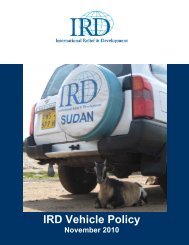
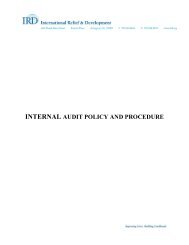
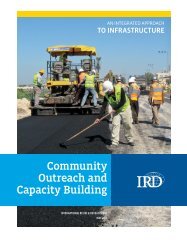
![Guide bonne pratique production d'oignon qualité_VF_4_2411012[1]](https://img.yumpu.com/23506639/1/184x260/guide-bonne-pratique-production-doignon-qualitac-vf-4-24110121.jpg?quality=85)
